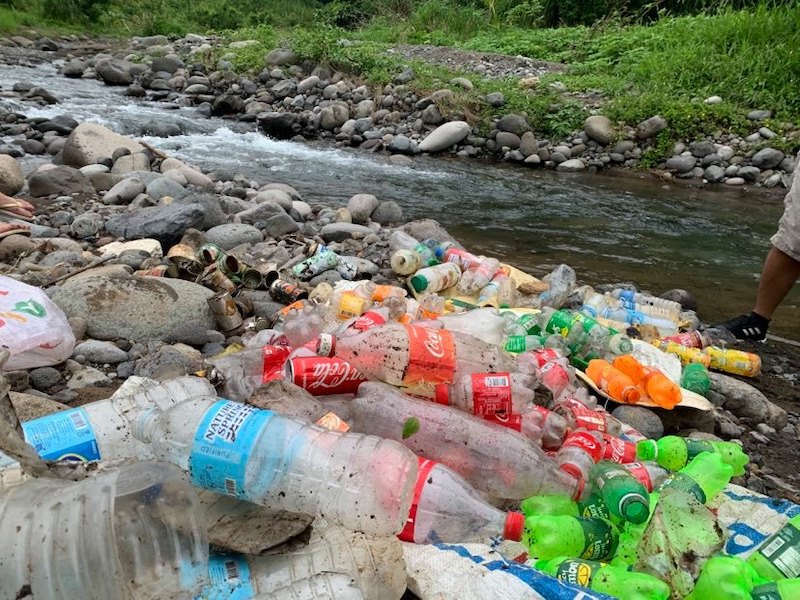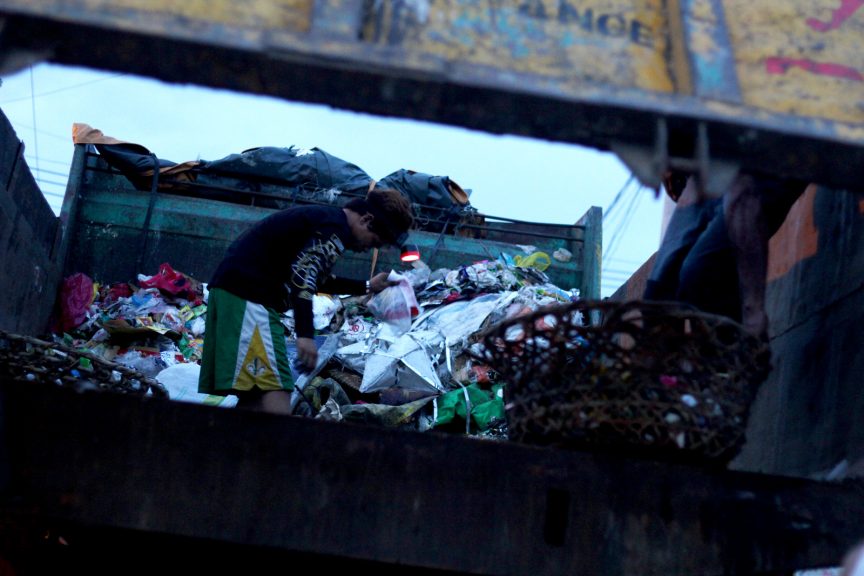 Assorted waste recovered during a river clean-up and brand audit at the Panigan-Tamugan Watershed in Baguio District, Davao City last September 26. (Photo courtesy of Interfacing Development Interventions for Sustainability)
Assorted waste recovered during a river clean-up and brand audit at the Panigan-Tamugan Watershed in Baguio District, Davao City last September 26. (Photo courtesy of Interfacing Development Interventions for Sustainability)
DAVAO CITY (MindaNews / 11 August) – Uphold the rights of the Dabawenyos to a “clean, healthy, and balanced environment” by rejecting a waste-to-energy (WTE) incineration project, environment group Interfacing Development Interventions for Sustainability (IDIS) told Mayor Sara Duterte on Tuesday.
IDIS said the WTE project only provides a “Band-Aid solution” to the city’s solid waste problem.
Commenting on Duterte’s statement that the city is determined to push through with the project, lawyer Mark Peñalver, IDIS executive director reminded the mayor of the local government’s campaign slogan that “Life is here.”
Peñalver urged Duterte to stop threats, imminent or not, against the environment and public health.
“It is unfortunate that despite scientific evidence and legal implications on the WTE incineration, the City is still pursuing such environmentally and health-threatening projects. I’m not sure what’s holding back the City from rejecting the project,” he told MindaNews on Tuesday.
He said it’s better to err on the side of caution than put the health of the Dabawenyos in jeopardy with a WTE project.
He added that a more efficient way of addressing the solid waste problem is ensuring strict implementation of existing policies, including the creation of materials recovery facilities and segregation at source.
Duterte said during her program over Davao City Disaster Radio (DCDR 87.5) on Monday that the local government was determined to continue a WTE project despite the strong opposition from environment groups.
She told environment advocates to direct their concerns to the Regional Development Council-Davao, the highest development policymaking body in the region, as the city has long decided to push through with the project, and has, in fact, requested support from Department of Environment and Natural Resources (DENR)-Davao.
The local government plans to build a WTE project in a 10-hectare property in Biao Escuela, Tugbok District.
“For us here in the City Government of Davao, we already crossed that bridge a long time ago when we purchased the property for the WTE plant in Davao City. It’s been decided already that there is a direction for WTE, and that we bought a property specifically for that purpose,” she said.
She added that the WTE project is also the “thrust” of the DENR.
The WTE project has been identified as among the programs and campaigns that her administration is undertaking to achieve a “cleaner and greener city.”
According to No Burn Pilipinas, a coalition of environment advocates in the Philippines, there are “documented failures of WTE from economic and investment perspectives and these are mostly from advanced and rich countries such as the UK, Germany, and Australia.”
The coalition said “emissions from incinerators contain heavy metals, dioxins and furans, which may be present in the waste gases, water or ash. Plastic and metals are the major sources of the calorific value of the waste.”
“The combustion of plastics, like polyvinyl chloride (PVC), gives rise to these highly toxic pollutants,” it said.
It noted that WTE is the most expensive way to produce energy.
 Workers sort collected garbage along R. Castillo Blvd in Agdao District, Davao City in this file photo taken on July 13, 2014. Mindanews file Photo
Workers sort collected garbage along R. Castillo Blvd in Agdao District, Davao City in this file photo taken on July 13, 2014. Mindanews file Photo
“It is 10 times costlier than coal-fired power plants and 4 times the nuclear. The one being proposed in Quezon City is said to produce 1kW at P524 while solar energy can be harnessed for only P53 or even less. These are just some of the reasons why WTE incineration in other countries are being phased out,” it added.
In a statement, Jill Banta, regional coordinator for Mindanao of Plastic Free Pilipinas, said that the mayor could reject a “polluting and costly project such as WTE incineration if she really wanted to.”
“It’s on her to listen to both the science of ecological waste management and the pleas of concerned citizens,” she said.
She added that the property bought for the WTE project could be used “as a composting facility that will process the city’s biodegradables, which are actually the majority of Davao’s waste.”
Peñalver said that a case has already been filed before the Supreme Court, questioning the authority and the validity of DENR’s Department Administrative Order No. 2019-21, the “Guidelines Governing Waste To Energy (“WtE”) Facilities for the Integrated Management of Municipal Solid Wastes.”
IDIS was one of the petitioners that brought the challenge before the Court, along with the EcoWaste Coalition, last month.
“As far as the local action is concerned, we are still looking into possible remedies that we could avail,” Peñalver added. (Antonio L. Colina IV/MindaNews)
